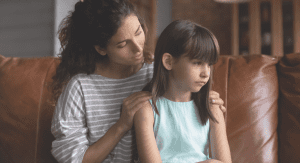Often our children are aware of death and dying even when they don’t entirely understand it. Following death and dying, we are all too often presented with grief and its infinite wake. There is no denying the same is true for our children.
There is no single strategy for navigating childhood grief, just as there is no timeline for grief in adulthood. Grief abides. Since we know this to be true, it is crucial that we offer support, guidance, and resources to our grieving little ones as they grow through time so that when issues resulting from death, dying, and grief appear, we can confront them with comfort and truth.
In my own life I have done everything backwards from neglecting to tell my daughter that her gerbil has passed away entirely (2x), to telling her that her great-grandma, her only great-aunt, her auntie, and more have “passed on.” I know there is no right way. Every child is different, unique, and comes coupled with their own complexities of grief. Now watching my little nephew go through this loss of his grandpa, I wish to offer some of the advice offered to me when I navigated death, dying, and grief with my little one.
Death, Dying, and Grief – Children Can Handle The Truth
Children are generally ego-centric and tend to view the world through a magical lens. Not telling your child about loss does not cause them to not have to handle the loss; it causes them to have to handle that loss alone. And nobody should struggle a loss alone. Fostering honesty through grief is the only way through it. Be real, be honest, and tell the truth so that your children don’t suffer in silence.
While it is difficult for us to confront our own feelings as adults on top of having to explain important life nuances to children, it is important to remember that not all facets of the world can be viewed through the lens of a child and that children are entitled to appropriate truth. Provide information (this tends to happen over time) and honest answers. Children are entitled to information about their loved ones. If not today, then when they are older. Help them know and understand what they need to fulfill them.
Clear language is helpful. Euphemisms cause confusion that over time can become compounded–we do not need to say things to soften a very awful experience. We need to do the opposite and fully experience them. Children need to understand the rational truth about concepts such as death and dying and allow them to match the words you’re trying to say, even when speaking that truth is hard for us as parents to speak to. Avoid expressions such as “passed away” or “expired.” Instead, use concrete clear words such as “death” and “dying.”
Also, don’t assume it’s a one-and-done conversation. Your children will have questions. Maybe not all at once, but they will come. Sporadically and when you least expect it, be prepared to be a coach through life–even when you’re sad yourself.
Ways to Support – Grow Through What You Go Through
Here are a few ways to support your children through grief, death, and dying:
- Don’t hide your own grief. Grow through it and let those little eyes see you. This validates their feelings and shows them they’re not alone. It’s hard on you too, but don’t turn inward, sis.
- Try to keep your rituals and routines the best you can and keep the memory alive. Don’t skip the standing family dinners and rituals. Try to keep and cultivate the best shared practices your child had with who they lost.
- Let them be a part of the life-celebrating rituals such as attending the funeral or drawing a picture to send away in the casket with your loved one. They want to remember contributing and celebrating this life as much as you.
- Maintain open communication. Be a listener.
- Encourage creative play as an outlet of support, create scrapbooks or memory boxes, or do activities together, intentionally describing all of your thoughts and feelings.
- Try reading children’s books which support this topic (for example, The Invisible String).
- If you are faithful, turn to your faith to foster support in a personal way to you. Oftentimes in faith, families find recovery, rehabilitation, and grounding in the wake of great loss and church, family, and faith can bring togetherness for lifelong bounds.
- Support children physically–cuddling, hugging, holding their hand, etc. Take them away from the busy bustle for a special event with just you.
- Keep close to familiar adults. Children need the same support we do; familiarity is key.
Death, Dying, and Grief Leave a Fingerprint
Death and dying is never the subject matter we wish to discuss. We wish to view the world through the same magical lens of our children. But I beg you not to forget that their world view is just a lens, and that while you grieve for what has been lost, your children grieve right alongside you.
It is important that we nurture the voids and spaces of grief in their lives as their brains continue to develop into complex and unique beings until the mid-twenties. It leaves a fingerprint that is uniquely influenced by developing age, temperament, type of death, connectedness to the deceased, reaction of others, and personality of those who are grieving.
Grief is not well-structured, intentional, and unending, and all children, like all adults, grieve in their own ways. Death and dying happen when we least expect it. Even in the instances you can expect it, you never can fully prepare for it. As such, it does not happen in neat and linear stages. It is our job as parents to fully embrace our children through every stage of life, especially the hard ones.











